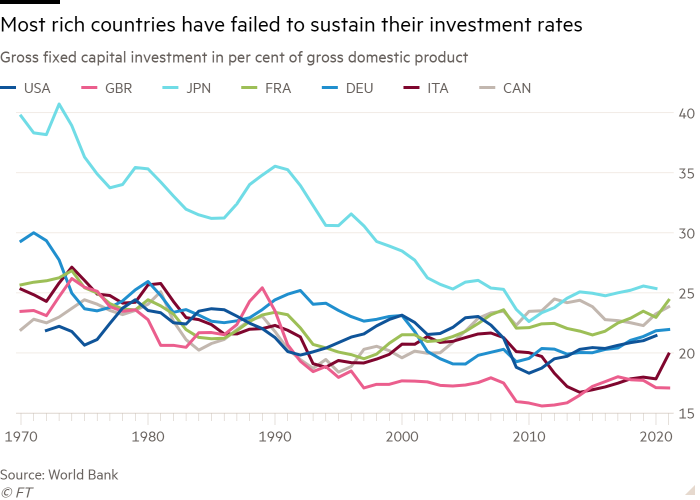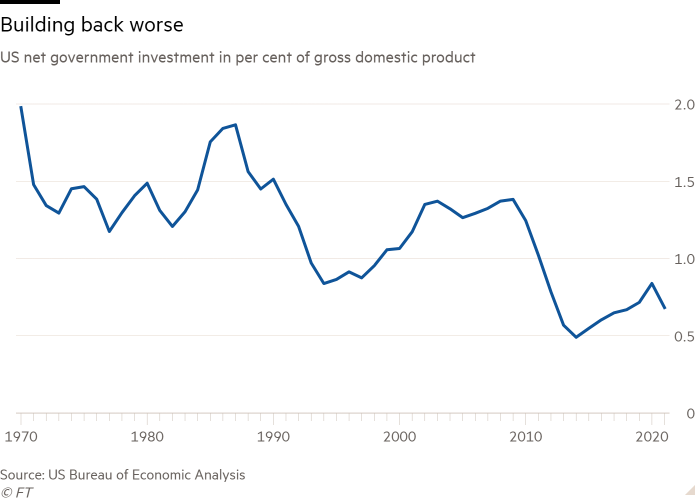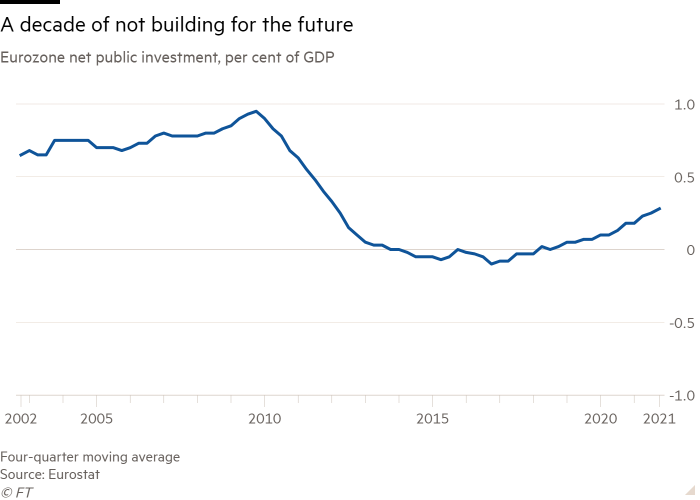In all the chat of “building back again better” and generating economies “match fit”, “strategically autonomous” and “resilient”, there is an unstated but tragic premise. For decades, most advanced economies did not establish their foreseeable future but languished in an investment drought, the scandal of which is larger for getting unacknowledged.
Among 1970 and 1989, the share of gross domestic item devoted to expense by six of the world’s 7 major economies averaged from 22.6 for each cent for the US to 24.8 for every cent for Germany. The seventh, Japan, was an outlier with 35 for each cent.
Of the G7, only Canada has sustained this level of financial commitment: its 22.5 for every cent in this millennium is hardly down from 22.8 back again then. All the other people have only managed to match their 1970-89 expenditure stages in four scenarios: the US in the increase many years of 2000 and 2005-06, and France in 2021.
Still these earlier 20 many years have been the era of lower-than-ever funding charges, first since of industry exuberance, then thanks to central banks’ ultra-lax financial policy. And what do we have to present for all that low-priced credit score? Two dropped decades for financial commitment. As economics writer Annie Lowrey concisely places it, “we blew it”.

France and the US have invested almost two percentage details of GDP less this century than they did in the 1970s and 1980s Germany and Italy about 4.5 details a lot less the United kingdom and Japan 6 and 10 percentage factors less respectively. These are massive numbers. The G7 account for about $45tn in yearly GDP. Restoring their expenditure ratios could fill virtually 50 percent the world wide shortfall to the $4tn the International Energy Agency calls for in yearly cleanse technology investment decision if we are to satisfy internet zero by 2050.
Those are overall financial commitment quantities, but a identical tale holds for the public sector on its possess. In the US, internet authorities expense (following accounting for depreciation of the present general public funds inventory) fell by practically two-thirds in the 10 years to 2014, when it dropped to .5 for every cent of GDP.

In the eurozone, internet community investment decision went unfavorable in the very same year, thanks to intense fiscal austerity in the eurozone periphery and continual less than-financial commitment in Germany.
Some will be tempted by statements that we will need not fear. It is regular to make investments considerably less as you get richer — so a person argument goes — because including to an presently substantial cash inventory is more and more ineffective. The expense of cash goods has fallen, so the very same cash buys you a lot more genuine financial commitment, goes yet another. A 3rd is that the existing economy needs intangible, not bodily capital, and though this is harder to measure, international locations appear to be to be performing greater on that front.
Still this sort of reassurances, even if factually correct, are no use. No 1 who normally takes a near appear at most western countries’ physical infrastructure can imagine it match for intent — not when that purpose expands to involve decarbonising our industries and power and transportation programs.

Why have we lived for so lengthy off earlier investments and failed to make sufficient new kinds? Funding costs have plainly not been the issue, with fascination charges at file lows. (Disaster-hit eurozone countries in the sovereign debt crisis had been the exception, but even Spain and Italy have out-invested Britain for decades.)
A lot more possible culprits are a deficiency of need and low-cost labour. Corporations that do not be expecting sufficient demand from customers to absorb expanded output have no reason to commit. And when they are permitted to address staff as low-priced and disposable, they could opt for that more than irreversible capital investments. This is why more quickly wage expansion and the so-called “labour shortages” (really competitors for staff) are something we should really embrace if we are to prod businesses into productive investments.
A little something very similar may have been genuine for low cost vitality in Europe. The 2010s have been a time of unusually minimal-price tag natural fuel and consequently electric power. This may possibly have undermined the urgency of investing in the two greater renewable generation and geopolitically harmless organic gasoline developments. Oil costs, as well, were very low for a great deal of the 10 years.
But underneath these economic elements, I consider our failure to spend is profoundly political. Elevating the investment-to-GDP ratio, irrespective of whether by boosts to non-public or community financial investment, or both equally, indicates that a more compact ratio of GDP is left in excess of for intake. Even if this prepares a improved long term, it can come to feel like a measlier existence nowadays. And that is something a era of politicians across the loaded world have been worried to inflict on their voters.
That is true in superior times, when transfer payments, tax cuts and fast public merchandise are all politically more attractive than money expense. (One thing equal is at function in the personal sector: witness companies’ decision to return money to homeowners by way of share buybacks alternatively than devote in their individual expansion.) It has also been accurate in bad periods, when financial investment is the least difficult expenditure for belt-tightening governments and companies to reduce.
European countries have come to rue how they utilised the “peace dividend” of 1989 to minimize defence paying out. The identical instant pushed the west as a full to forget the broader strategy of limited-phrase sacrifice for a a lot more prosperous foreseeable future. But this is not unavoidable, as exceptions these types of as Canada and the Nordics’ sustained financial commitment display. Western voters and governments have both unlearned the virtue of delayed gratification. They have to relearn it, and quickly.

























